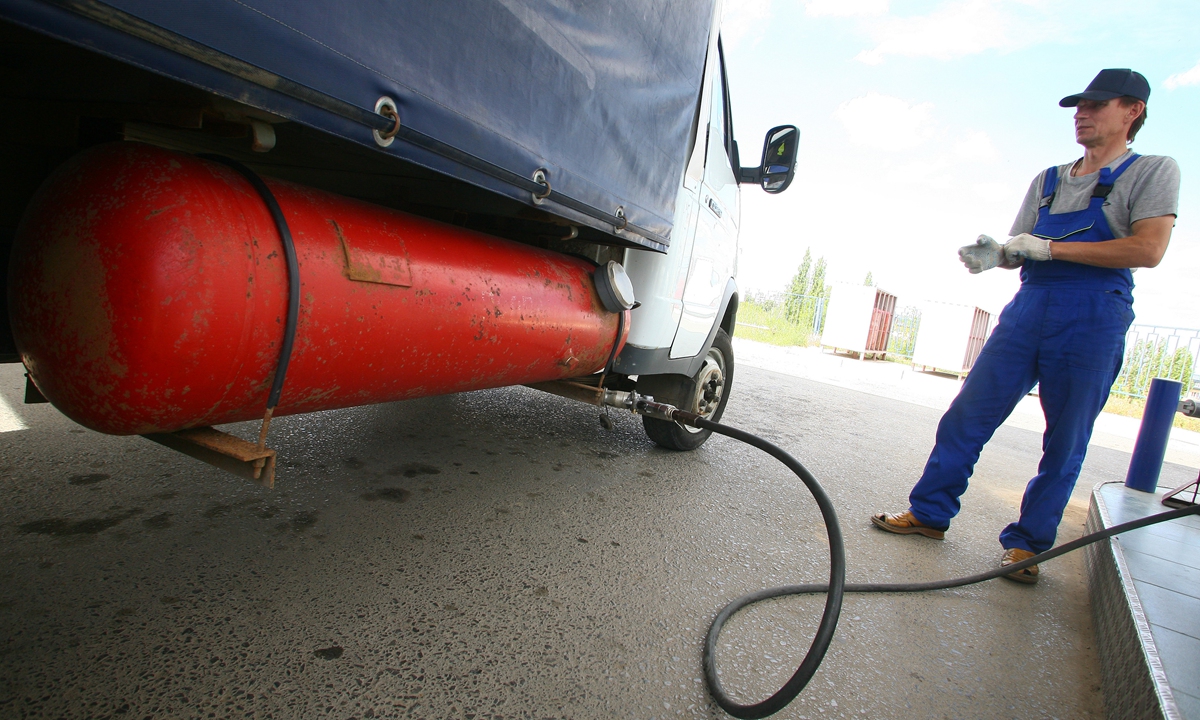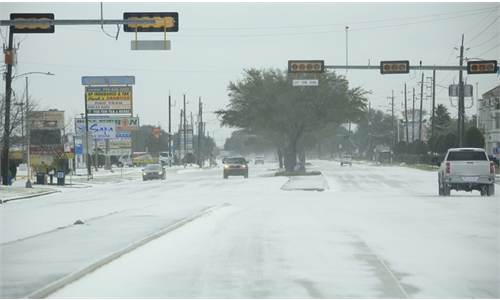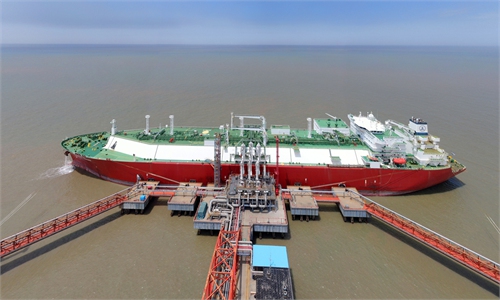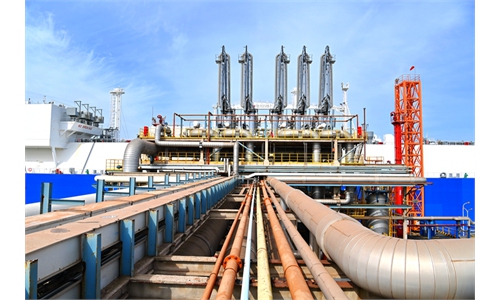COMMENTS / EXPERT ASSESSMENT
US' 'natural gas alliance' aimed at containing Russia could hardly work

A van is being filled with fuel at a liquefied natural gas (LNG) station in Volgograd, Russia.Photo: VCG
The US is reportedly in talks with Qatar in a so-called global strategy over the supply of liquefied natural gas (LNG) to the EU. Some observers say this is an alliance to contain Russia. Yet, such strategy could hardly work.
Like other commodities, impacted by the pandemic, the global economic recovery and bottlenecks in the supply chain, the supply and demand of natural gas has been hit and the climbing trend of prices will not ease for a while. Facing a tight supply and constant conflicts between Russia and the West, European countries are increasingly looking at their trade of natural gas with Russia under a geopolitical light. They tend to abruptly blame Russia for soaring prices of natural gas and deliberately ignoring market dynamics.
The US has historically intensified its strategic kidnapping of its allies by promoting the "decoupling" of EU-Russia energy cooperation. In the Trump era, the US threatened its European allies and imposed sanctions on companies building the Nord Stream 2 project. In 2019, the US persuaded Qatar to actively supply LNG to Europe to reduce European gas purchases from Russia. This time, the US hopes to interfere with EU-Russia energy cooperation by "matching" some of its allies. However, given the reality of the natural gas industry it is difficult for the US to contain Russia with its maneuver.
The transportation of natural gas needs extensive infrastructure, and the cost and technical challenges of cross-regional transportation are big issues. This resulted in the absence of a global market and the consolidation of several regional markets with a geographical distribution of natural gas resources. For example, there is a regional market of natural gas among the US, Canada and Mexico. Another one exists between Russia, Central Asian countries and the EU.
Despite the fact that rising volumes of natural gas circulate around the world on LNG ships, and that LNG's share among short-term transactions has increased, from 16 percent in 2009 to 40 percent in 2020, LNG still has no price advantages compared with pipeline natural gas. In the global trade of natural gas, LNG only plays a supplementary role.
At present, the market is the main driver of global LNG trade. East Asia, with rising economic influence but without a complete connection with the traditional natural gas market, has become the main global consumer of LNG. And it also pays a premium compared to customers in Europe and the Americas.
About three-quarters of Qatar's LNG is sold to Asia while European countries are significantly increasing LNG imports. However, compared with Russian natural gas supplied by pipelines, LNG is still not cost-effective. Russia accounted for 46.8 percent of EU natural gas imports in the first half of 2021. Qatar, in comparison, only accounted for 4.3 percent. Its total natural gas production in 2020 was 171.3 billion cubic meters, while Russia's exports to Europe in 2020 reached 156.4 billion cubic meters.
The price of LNG is also more volatile based on the global supply and demand dynamics. In 2021, the European LNG CIF price rose from $250 in January to $1,000 in September. To increase the share of Qatar's LNG, European countries must give it more favorable prices than in Asia. At the same time, Qatar's LNG infrastructure and related efforts to stabilize the supply chain will take several years. The costs will be transferred to the price of gas, further weakening Qatar's LNG competitiveness in the face of Russian pipeline natural gas. All told, using LNG to squeeze or even replace the position of Russian natural gas in the European energy market, and then achieve the goal of containing Russia and promoting Europe's decoupling, is nothing short of a fantasy.
Nonetheless, the move by the US has brought negative impacts to the global energy market and this deserves attention.
On one hand, increasing LNG supply is one of Europe's "supply diversification" efforts to "guarantee energy security". Relevant measures will further enhance the EU's willingness to "control its dependence on Russia." Under the background that the new German government has de facto suspended the opening and operation of the Nord Stream 2, both the political environment and the will to cooperate are not conducive to deepening pragmatic energy cooperation between Europe and Russia. Weighing and dealing in mutual accusations over energy issues may become the norm.
On the other hand, the US' move is essentially a political intervention on the market for geopolitical purposes and this seriously affects the future expectations of energy producers, consumers and investors. It is not only unhelpful to solve the current global shortage of energy supply, but also injects more uncertainty into the market. In addition, the steps by the US to control Russia through natural gas trade reflect its geopolitical considerations and also serve the interests of the US energy industry. Against the background of a tightening global energy supply, the US has receded, from selling natural gas to Europe to promoting its Middle East allies for the sake of ensuring its domestic supply of natural gas.
The article was based on a commentary written by Dong Yifan, a research fellow at the Institute of European Studies, China Institutes of Contemporary International Relations. bizopinion@globaltimes.com.cn



